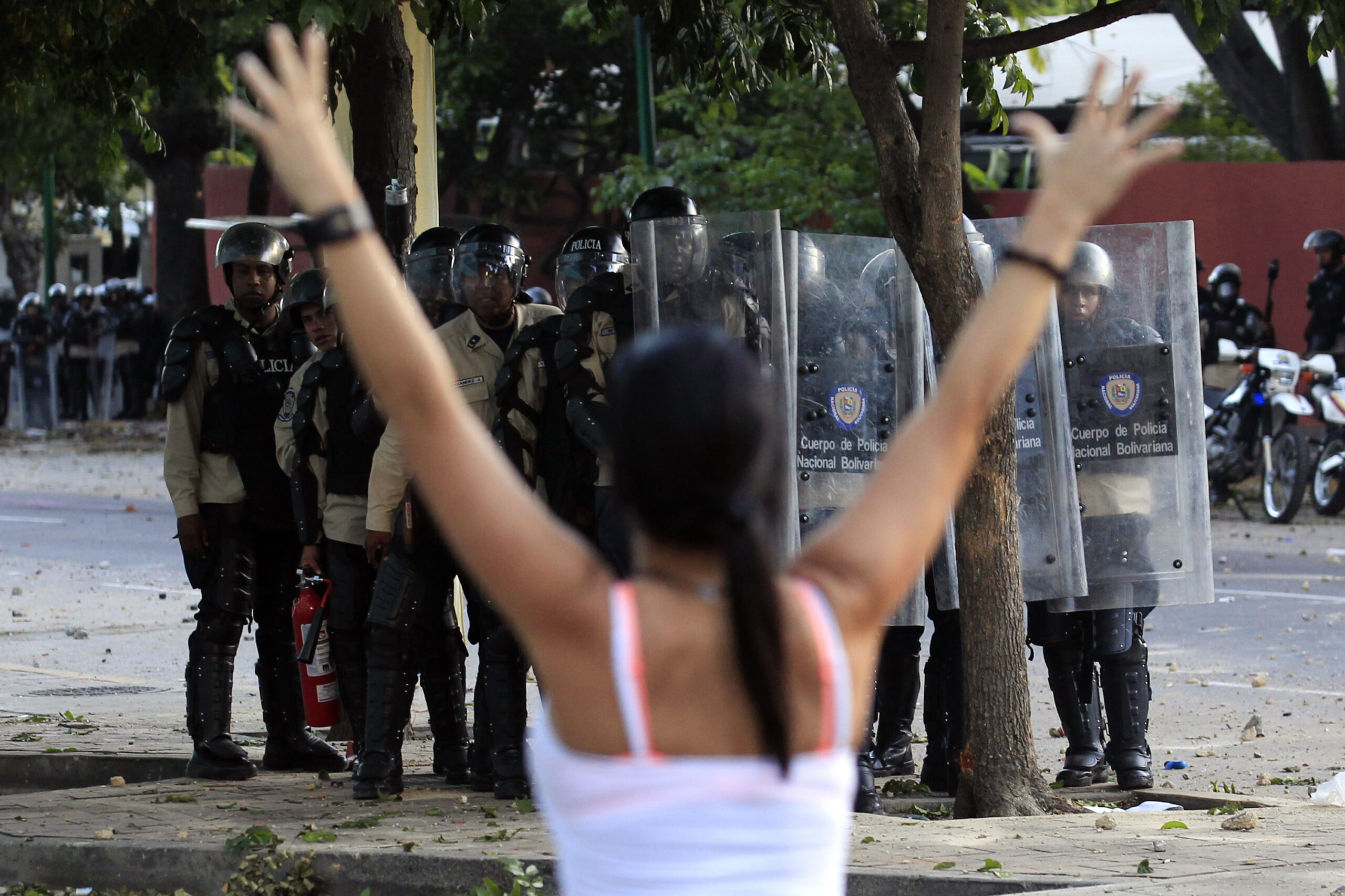Desplácese hacia abajo para leer en español
Venezuelan survivors and families of victims of crimes against humanity testified against alleged perpetrators this week in a landmark hearing in Buenos Aires. The Clooney Foundation for Justice (CFJ) represents the relatives of two of the victims and acts as a plaintiff in the case.
In June 2023, after one year of investigations, CFJ’s The Docket team filed a complaint before the Argentine federal justice system containing over 15,000 pages of evidence of crimes against humanity committed in Venezuela, specifically indiscriminate violence and killings by government security forces in connection with widespread protests in the country that took place in 2014. Less than a month later, an Argentinian federal prosecutor launched an investigation into these alleged crimes.
“It was an honor to accompany the survivors as they took the brave step of traveling to Buenos Aires to testify in this historic hearing,” said Yasmine Chubin, Legal Advocacy Director of The Docket. “This is the first time victims of crimes against humanity in Venezuela have been heard by an impartial court. Argentina now has the opportunity to deliver the justice they have been seeking for over 10 years.”
Under the principle of universal jurisdiction, countries like Argentina can prosecute international crimes regardless of where they were committed and of their perpetrators’ nationality.
Given the Venezuelan authorities’ failure to investigate these alleged international crimes, which include murder, torture, sexual violence, and arbitrary detention, Argentina’s investigation offers survivors and families of victims renewed hope that a path to justice may still lie ahead.
“In The Docket’s fight for justice for survivors from Ukraine and the Democratic Republic of Congo to Venezuela and elsewhere around the world, universal jurisdiction has proven to be a powerful tool for those seeking accountability for international crimes,” Chubin said. “Universal jurisdiction counters impunity resulting from the lack of genuine investigations in certain national jurisdictions where international crimes have been committed by providing additional venues for accountability alongside the International Criminal Court.”
About the Clooney Foundation for Justice’s Docket Initiative
The Docket triggers prosecutions against perpetrators of war crimes and mass atrocities, and represents survivors in their pursuit of justice. The Docket seeks to hold abusers of human rights accountable to survivors, victims, and their families. Its work takes place in conflict zones and courtrooms. The Docket gathers evidence of international crimes and uses that evidence to trigger official investigations and prosecutions by international, regional, or national courts. The Docket represents and supports survivors, witnesses, and victims’ families in court, helping them tell their stories and seek legal accountability.
Víctimas venezolanas de graves violaciones de derechos humanos testifican en una audiencia histórica en Argentina
Supervivientes y familiares de víctimas venezolanas de crímenes de lesa humanidad han declarado contra los presuntos autores de estos crímenes esta semana en una vista histórica celebrada en Buenos Aires. La Clooney Foundation for Justice (CFJ) representa a los familiares de dos de las víctimas y actúa como demandante en la causa judicial.
En junio de 2023, tras un año de investigaciones, el equipo de The Docket de CFJ presentó una denuncia ante la justicia federal argentina que contiene más de 15.000 páginas de evidencias de crímenes de lesa humanidad cometidos en Venezuela, específicamente violencia indiscriminada y homicidios cometidos por las fuerzas de seguridad del gobierno en relación con las protestas generalizadas en el país que tuvieron lugar en 2014. Menos de un mes después, un fiscal federal argentino inició una investigación sobre estos presuntos crímenes.
“Fue un honor acompañar a las personas supervivientes cuando dieron el valiente paso de viajar a Buenos Aires para testificar en esta audiencia histórica”, ha declarado Yasmine Chubin, Directora de Asesoramiento Jurídico de The Docket. “Es la primera vez que las víctimas de crímenes de lesa humanidad en Venezuela son escuchadas por un tribunal imparcial. Argentina tiene ahora la oportunidad de impartir la justicia que las víctimas llevan buscando más de 10 años.”
En virtud del principio de jurisdicción universal, países como Argentina pueden enjuiciar crímenes internacionales con independencia de dónde se hayan cometido y de la nacionalidad de sus autores.
Ante la falta de investigación por parte de las autoridades venezolanas de estos presuntos crímenes internacionales, que incluyen asesinatos, torturas, violencia sexual y detenciones arbitrarias, la investigación de Argentina ofrece a las personas supervivientes y a las familias de las víctimas nuevas esperanzas de que aún puede haber un camino hacia la justicia.
“En la lucha de The Docket por la justicia para las personas supervivientes, desde Ucrania y la República Democrática del Congo hasta Venezuela y otros lugares del mundo, la jurisdicción universal ha demostrado ser una poderosa herramienta para quienes tratan de exigir responsabilidades por crímenes internacionales”, afirmó Chubin. “La jurisdicción universal contrarresta la impunidad derivada de la falta de investigaciones auténticas en determinadas jurisdicciones nacionales en las que se han cometido crímenes internacionales, proporcionando vías adicionales para la rendición de cuentas junto con la Corte Penal Internacional.”
Información sobre la iniciativa Docket de la Clooney Foundation for Justice
The Docket impulsa acciones judiciales contra los autores de crímenes de guerra y atrocidades masivas y representa a las personas supervivientes en su búsqueda de justicia. La iniciativa tiene por objeto que los autores de abusos contra los derechos humanos rindan cuentas ante las personas supervivientes, las víctimas y sus familias. Su trabajo se desarrolla en zonas de conflicto y en los tribunales. The Docket recaba información sobre crímenes internacionales y la utiliza para poner en marcha investigaciones oficiales y enjuiciamientos por parte de tribunales internacionales, regionales o nacionales. The Docket representa y apoya a las personas supervivientes, a las y los testigos y a las familias de las víctimas ante los tribunales, ayudándoles a contar lo sucedido y a exigir responsabilidades legales.
